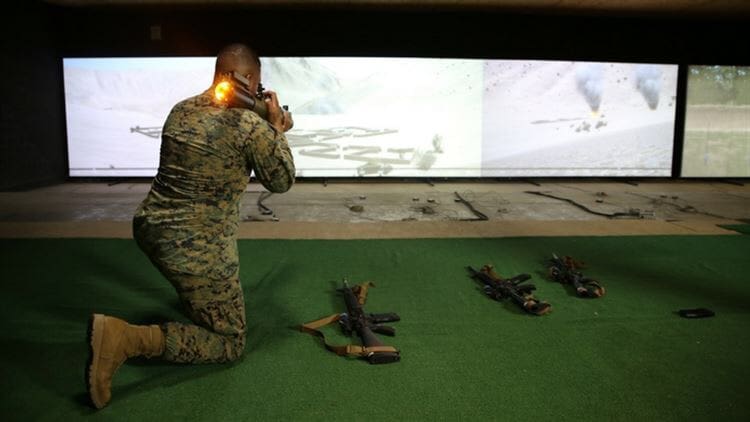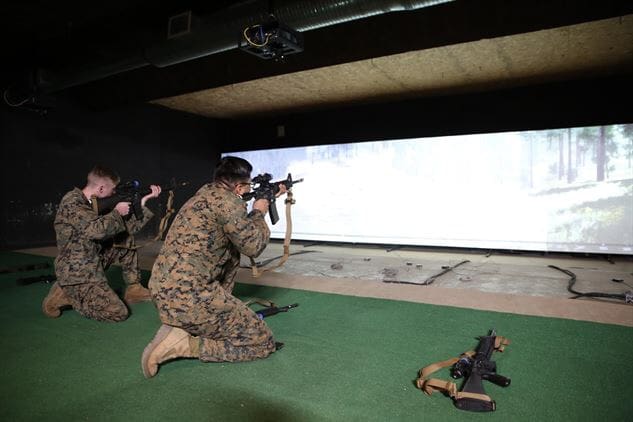MARINE CORPS BASE QUANTICO, Va. — The Marine Corps’ next-generation marksmanship trainer is headed to the fleet. The Indoor Simulated Marksmanship Trainer III adds three new weapons, 3-D imagery, and enhanced training modes, giving Marines a better, more realistic training experience as they prepare for the complexities of modern warfare.

Master Sgt. Jorge Carrillo, staff non-commissioned officer-in-charge at Marksmanship Training Battalion aboard Marine Corps Base Quantico, Virginia, fires an M72 Light Anti-Tank Weapon, one of the new additions to the Indoor Simulated Marksmanship Trainer III. The ISMT III adds three new weapons, 3-D imagery, and enhanced training modes, giving Marines a better, more realistic training experience as they prepare for the complexities of modern warfare. (U.S. Marine Corps photo by Ashley Calingo)
New weapons, better graphics
The Marine Corps adopted virtual training in the mid-1990s as a way to sharpen Marines’ marksmanship skills. This first system—the Firearms Training Simulator—was designed primarily to train Marines for rifle and pistol qualifications. Over time, FATS evolved into ISMT, which added new weapons and video scenarios for Marines. ISMT III ups the ante by providing wireless connectivity to the M9 service pistol, M4 carbine and adding three new wireless weapons—the M27 Infantry Automatic Rifle, M32A1 Multi-Shot Grenade Launcher and M72 Light Anti-Tank Weapons.
“In the evolution of this training system, it went from a specific one to two weapon system and now pretty much covers the full spectrum of small arms weapons that are used by the Marine Corps today,” said Chief Warrant Officer 4 Matthew Harris, ISMT III project officer in Marine Corps Systems Command’s Training Systems. “ISMT helps to build fundamentals of muscle memory for Marines so that when they hit the range, they are ready to respond to real-life scenarios.”
Harris also noted that ISMT III includes filters for the squad day optic and machine gun day optic Marines use with the M27 and M240 to alleviate the problem of pixilation when shooting in a virtual environment.
“Before, if Marines used the optic inside the ISMT, they could see all of the pixilation because the optic would magnify what’s on the ISMT screen. ISMT III incorporates a diffuser, allowing Marines to use the optic inside the simulation without the blurry pixilation of the screen,” said Harris.
ISMT III also improves the user’s experience by providing 3D graphics and imagery that is consistent with the graphic capabilities offered by most gaming systems today, said Harris.
“The old system had very rudimentary, two-dimensional graphics,” said Harris. “In the old system, if you were looking at a tree, it would look flat from any angle. ISMT III offers industry-standard graphic imagery. So, instead of having an outline of a figure, you can actually see the roundness of the shoulder, the front and back of them as he’s moving to and from.”

Marine Corps’ next-generation virtual marksmanship trainers hit the fleet Cpls. Noah Paul and Geovanni Martinez, combat marksmanship coaches and Indoor Simulated Marksmanship Trainer operators, fire M27 Infantry Automatic Rifles at the ISMT III training range aboard Marine Corps Base Quantico, Virginia. The M27 is one of three new weapons offered with the ISMT III. The M27 comes with enhanced squad day optics, which enable Marines to see their screens more clearly in a virtual environment. The ISMT III adds three new weapons, 3-D imagery, and enhanced training modes, giving Marines a better, more realistic training experience as they prepare for the complexities of modern warfare. (U.S. Marine Corps photo by Ashley Calingo)
Enhanced training modes, capabilities
ISMT III also improves the user’s training experience with collective training mode capabilities and additional, enhanced training and judgement scenarios. The collective training mode is new to ISMT III and enables Marines to train side-by-side and work on a common objective before heading to the training range.
“Say you’re going to Twenty-Nine Palms and are going to run a range for a platoon-supported attack,” said Harris. “I can bring in a machine gun squad and have them go through—in collective mode—training to work on communication, target identification and suppression, ammunition consumption. Marines can now go through some of the minor details that they typically couldn’t do unless they went out to the range and fired live.”
Perhaps one of ISMT III’s greatest training enhancements is the addition of several authoring stations across the Corps that enable Marines—in conjunction with combat camera troops and other skilled video personnel—to film and upload their own scenarios.
“If Marines are looking for a specific training scenario that isn’t currently available, they can use the authoring station to create that scenario,” said Harris.
The 10 new judgement scenarios enable Marines to immerse themselves in realistic environments and situations—such as a vehicle checkpoint, a room clearing, gate operations or an active shooter situation. Harris said the new judgement scenarios are not just infantry-specific; they are “Marine Corps-esque” situations in which any Marine could potentially find him or herself.
ISMT III can also simulate moving targets, one of the upgraded training enhancements from previous ISMT iterations.
“One of the scenarios in ISMT III that wasn’t in the older version is that of a moving target,” said Master Sgt. Jorge Carrillo, staff noncommissioned officer-in-charge at Marksmanship Training Battalion aboard Marine Corps Base Quantico. “In this scenario, the target simulates movement, like it’s closing in on the shooter. In real life, the Marine closes in on the target, but you can’t really do that indoors. But because the screen simulates movement, you’re actually able to execute training as if you were doing it outside in the real world.”
“The best marksmen the military can offer”
The Corps has fielded around 200 of the 490 ISMT III systems destined for major Marine Corps bases, reserve duty sites, amphibious transport docks and amphibious assault ships worldwide. Land-based installations of ISMT III are projected to be finished by September 2018. Amphibious installations will occur concurrently, but may take more time to implement than land-based installations due to the need to retrofit the system onto designated spaces aboard each ship.
“Marksmanship is embedded in the Marine Corps,” said Carrillo. “As technology advances and weapons get better and more accurate, we need to teach Marines how to use those weapons and improve their marksmanship, so that we can continue to be the best marksmen the military can offer.”
By Ashley Calingo, MCSC Office of Public Affairs and Communication | Marine Corps Systems Command


ISMT sounds great and all. It even checks off a bunch of training boxes. We had ISMT at San Mateo and used it exactly one time in 4 years for a total of 20 minutes. What’s a grunt to do?
I always think all the $$$ spent on shit like this could be spent on sim and live rounds instead…